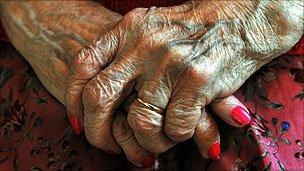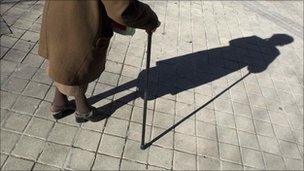Loneliness is 'hidden killer' of elderly
- Published

Campaigners want to raise awareness of the link between loneliness and poor health
Loneliness is the "hidden killer" of elderly people, says a campaign group, which is calling for greater recognition of the link between isolation and ill-health.
A group of charities is launching the Campaign to End Loneliness.
It warns that lonely older people are at increased risk of depression, lack of exercise and bad diet.
The campaign says that almost one in 10 elderly people suffers from "intense" loneliness.
The campaign group wants loneliness to be recognised as a public health issue - and has published a survey claiming that fewer than one in five people is aware of the link between poor health and loneliness.
The campaign has been set up by Independent Age, Age UK Oxfordshire, Counsel and Care and WRVS and funded by the Calouste Gulbenkian Foundation.
Trapped
While people are aware of the emotional problems of loneliness, the campaign says few recognise the physical damage.
It warns of elderly people trapped in their own homes by a lack of mobility and the loss of family and friends.

A tenth of elderly people see their friends or families less than once a month, says the charity
A lack of social interaction can make old people more vulnerable to depression and to problems such as excessive drinking, poor diet and a reduction in exercise.
The campaigners say that "loneliness adversely affects the immune and cardio-vascular systems" and a lack of social interaction is linked to the onset of Alzheimer's disease.
"The problems of loneliness and isolation need to be put on an equal footing with any other condition associated with ageing. Ending loneliness should be part of the solution to the challenge of reforming care and support," said campaign director Laura Ferguson.
The campaign wants to highlight the importance of loneliness in the lives of the elderly.
More than half of people over the age of 75 are living alone - and about one in 10 says he or she suffers from "intense" loneliness.
According to the campaign, almost one in five old people sees family, friends or neighbours less than once a week - and about one in 10 of them experiences such social interaction less than once a month.
A spokeswoman for the campaign says that there is a need for informal and formal attempts to tackle such loneliness, either through organised befriending schemes or through neighbours helping one another.
She said that it was a problem that was often overlooked and which could manifest itself in other ways, such as health problems.